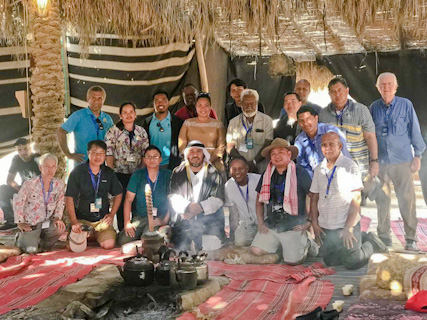
We said goodbye this month to 18 United Bible Societies translators from 11 Asia-Pacific countries (Fiji, Hong Kong, India, Myanmar, Nepal, Papua New Guinea, Philippines, Sri Lanka, Thailand, Tonga and Vanuatu). Having never seen Israel before, many said being here was a “dream come true,” and that it would help them translate the Scriptures more appropriately and with renewed faith.
Our 2019 “Land of the Bible” short-course calendar opened with an Open Course for Consultants, attended by 12 people from Asia, the USA and the UK.
Later, a generous donation from an anonymous source to The Word For The World enabled us to host their Bible translators for the first time. This brought people from Africa, India, South Africa, USA and Finland—what a joy! We are thankful to you, readers, who help us serve these “workers in the field.” Thanks be to God!
‘Land of the Bible’ Student Testimony:
“… moving around the realities of the life, the people, the culture, the topography, touching the water, stones, trees … we really feel that sense, that power, that God has been acting in history. And so this exposure is a very empowering one for all of us and as a Consultant, I really feel very privileged.
“… this will go a very long way in terms of giving out this knowledge, sharing this vital information that we have learned … wherever we go we will continue to be a mouthpiece … to the community of faith that we belong to.”
We Didn’t Know:
Visiting translators have been shocked many times at the unexpected natural features of Israel.
The hilly mountains of Israel? Not at all like the sheer slopes of Nepal!
The Kidron valley is small! Not flat and wide like we imagined!
The Jordan River is a muddy stream?
The Mount of Olives? It’s is not high enough to be called a hill in my language!
One of our visiting translators from Tonga had to grapple with the geography and topography of Israel, when in her country, Everywhere else is just ocean, no mountains no valleys, nothing deep or high!
The Importance:
How often Biblical imagery and even spiritual concepts draw from Israel’s natural context for expression. It is important to understand Israel’s topography, climate, agricultural cycles and even its cycles of rainfall to understand certain Biblical connections. It is important for translators to understand the natural context of the Bible when communicating these matters in their native tongues.

Where local languages reflect their own cultural contexts, individual terms can be so specific that it is possible to miss or mistranslate references in the Biblical text. Our record-breaking year for “Land of the Bible” course is giving visiting translators new and vivid understanding that will inform their work in their communities.
